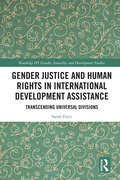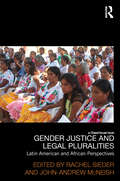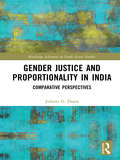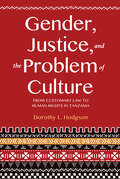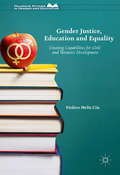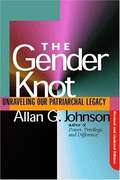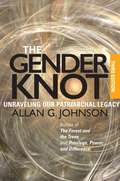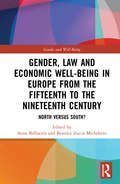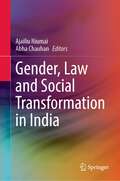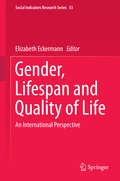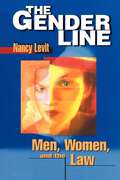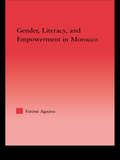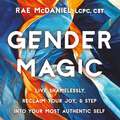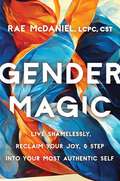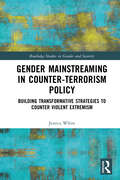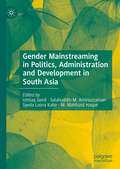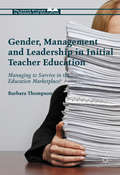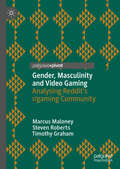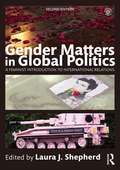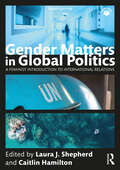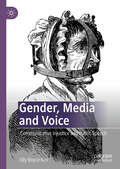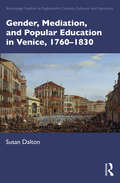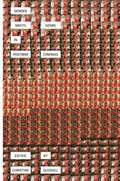- Table View
- List View
Gender Justice and Human Rights in International Development Assistance: Transcending Universal Divisions (Routledge ISS Gender, Sexuality and Development Studies)
by Sarah FortiGender Justice and Human Rights in International Development Assistance provides a critical analysis of how frameworks of gender equality play out in the field of international development assistance, at theoretical, international legislative and policy levels, donor and national policy levels and programme levels. If current dominant theoretical perspectives are not interrogated, the consequences could be that gender inequalities and injustices are inadequately addressed, or that opportunities are missed to impact on poverty reduction and on transformative gender changes. Through a renewed interpretation of gender equality in IDA, the book aims to show the way towards a more effective response to gender inequalities and injustices faced by women in developing countries. Drawing on 20 years of experience working with IDA policies and programming across three continents, this book makes an important contribution to the active and dynamic field of critical feminism, as well as providing practical illustrations on how such critical thinking might contribute to gender transformational changes. Gender Justice and Human Rights in International Development Assistance will be important reading for scholars and upper level students working in the fields of gender equality, human rights, development assistance, foreign affairs, international law, and international relations.
Gender Justice and Legal Pluralities: Latin American and African Perspectives (Law, Development and Globalization)
by Rachel Sieder John-Andrew McNeishGender Justice and Legal Pluralities: Latin American and African Perspectives examines the relationship between legal pluralities and the prospects for greater gender justice in developing countries. Rather than asking whether legal pluralities are ‘good’ or ‘bad’ for women, the starting point of this volume is that legal pluralities are a social fact. Adopting a more anthropological approach to the issues of gender justice and women’s rights, it analyzes how gendered rights claims are made and responded to within a range of different cultural, social, economic and political contexts. By examining the different ways in which legal norms, instruments and discourses are being used to challenge or reinforce gendered forms of exclusion, contributing authors generate new knowledge about the dynamics at play between the contemporary contexts of legal pluralities and the struggles for gender justice. Any consideration of this relationship must, it is concluded, be located within a broader, historically informed analysis of regimes of governance.
Gender Justice and Proportionality in India: Comparative Perspectives (Routledge Advances in South Asian Studies)
by Juliette Gregory DuaraFor a judiciary in a democracy, dispensing justice is not only about doing justice, but also about showing that justice is being done; it is about giving reasons and creating a "culture of justification". The question becomes how to nurture such a culture. A number of liberal democratic jurisdictions have answered this question in part with the adoption of the multi-step method of evaluating the constitutionality of legislative infringements on fundamental rights widely known as Proportionality Analysis. Under Proportionality Analysis courts must engage in a structured process of reasoning. This book deals with Gender Justice and Proportionality Analysis in India. The author argues that the Supreme Court of India should consider adopting Proportionality Analysis for the adjudication of the fundamental right to sex equality in Indian courts. The book includes an analysis of Canadian and South African Proportionality Analysis and makes some suggestions on how an Indian Proportionality Analysis could be generated using this comparative investigation. Additionally, the book proposes ways of applying the effects of socio-political context on doctrine, as well as doctrine’s interpretive impact on adjudicated outcomes for gender, thus making a contribution to feminist jurisprudence. Finally, the author analyses Indian gender equality jurisprudence, demonstrating the inadequacies of the current doctrinal framework for achieving the goal of substantive gender equality and suggesting ways in which an Indian Proportionality Analysis might be fashioned to address these inadequacies. A novel examination of the gender situation in India in comparative perspective, this book will be of interest to academics in the field of Gender Studies, Asian and Comparative Law and South Asian studies.
Gender, Justice, and the Problem of Culture: From Customary Law to Human Rights in Tanzania
by Dorothy L. HodgsonAn analysis of the relationships between law, custom, gender, marriage and justice among northern Tanzania’s Maasai communities.When, where, why, and by whom is law used to force desired social change in the name of justice? Why has culture come to be seen as inherently oppressive to women? In this finely crafted book, Dorothy L. Hodgson examines the history of legal ideas and institutions in Tanzania—from customary law to human rights—as specific forms of justice that often reflect elite ideas about gender, culture, and social change. Drawing on evidence from Maasai communities, she explores how the legacies of colonial law-making continue to influence contemporary efforts to create laws, codify marriage, criminalize FGM, and contest land grabs by state officials. Despite the easy dismissal by elites of the priorities and perspectives of grassroots women, she shows how Maasai women have always had powerful ways to confront and challenge injustice, express their priorities, and reveal the limits of rights-based legal ideals.“This is a book that only Dorothy Hodgson could have written, with her decades of work in Tanzania, vast networks in Maasailand, and deep ethnographic knowledge, combined with her deftness in working through more theoretical work on gender and human rights. Closely argued, conceptually sharp, and engagingly written.” —Brett Shadle, author of Girl Cases: Marriage and Colonialism in Gusiiland, Kenya, 1890-1970“Dorothy Hodgson asks a number of important and clearly articulated questions, and provides thoughtful answers to them using a hybrid of historical and anthropological methodologies that combine in-depth case studies with more empirically-informed macro-level reflection. A concise and useful resource in the undergraduate as well as the graduate classroom.” —Priya Lal, author of African Socialism in Postcolonial Tanzania: Between the Village and the World“Gender, Justice, and the Problem of Culture makes a significant contribution to the study of law in East Africa and elsewhere among colonized peoples, and it should be required reading not only for academics interested in such matters but for activists and policymakers.” —American Anthropologist“Hodgson’s book is both rich in detail and broad in its implications for understanding struggles for justice for marginalised groups. It deserves the attention of students and scholars of African studies, anthropology, history, political science and women’s and gender studies.” —Journal of Modern African Studies
Gender Justice, Education and Equality
by Firdevs Melis CinThis book reframes gender and education issues from a feminist and capabilities perspective through a multi-generational study of women as teachers. It explores how different understandings of gender, equality and education generate a variety of approaches with which to pursue gender equality in education. Through employing the capabilities approach in a critical and innovative way to question justice, agency and well-being and also to evaluate valued functionings and capabilities, freedoms and lack of opportunities in women's lives in Turkey it highlights the need for constructing a gender-just society. The book takes a closer look at these women's memories, in order to understand how gender roles were created, negotiated and contested, and how the transition to modern ways of socialising and existing was shaped and women's emancipation was guided by women teachers as social actors, rather than as passive onlookers or oppressed individuals. It provides important insights and critical evidence to be used in the planning and implementation of education and social/gender policies.
The Gender Knot: Unraveling Our Patriarchal Legacy
by Allan G. JohnsonThe book describes in detail the patriarchal system under which societies exist and suggests ways of beginning to unravel that knot.
The Gender Knot: Unraveling Our Patriarchal Legacy; Third Edition
by Allan G. JohnsonNew Third Edition! The Gender Knot, Allan Johnson's response to the pain and confusion that men and women experience by living with gender inequality, explains what patriarchy is and isn't, how it works, and what gets in the way of understanding and doing something about it. Johnson's simple yet powerful approach avoids the paralyzing trap of guilt, blame, anger, and defensive denial that often results from conversations about gender. This edition features: • Updated references, data, resources, and examples, especially in relation to issues of sexual orientation and gender identity (e.g., gay marriage, transgender/cisgender) • A glossary of terms • A new chapter, "What Changes and What Does Not: Manhood and Violence," that provides an extended analysis of the causes of men's violence as a patriarchal phenomenon
The Gender Knot: Revised and Updated Edition
by Johnson Allan G.The Gender Knot, Allan Johnson's response to the pain and confusion that men and women experience by living with gender inequality, explains what patriarchy is (and isn't), how it works, and what gets in the way of understanding and doing something about it. Johnson's simple yet powerful approach avoids the paralyzing trap of guilt, blame, anger, and defensive denial that often result from conversations about gender. He shows how we all participate in an oppressive system we didn't create and how each of us can contribute towards its dissolution. He argues persuasively that something much better is possible and that our individual choices matter more than we can ever know.
Gender, Law and Economic Well-Being in Europe from the Fifteenth to the Nineteenth Century: North versus South? (Gender and Well-Being)
by Anna Bellavitis Beatrice Zucca MichelettoThis book offers a comparative perspective on Northern and Southern European laws and customs concerning women’s property and economic rights. By focusing on both Northern and Southern European societies, these studies analyse the consequences of different juridical frameworks and norms on the development of the economic roles of men and women. This volume is divided into three parts. The first, Laws, presents general outlines related to some European regions; the second, Family strategies or marital economies?, questions the potential conflict between the economic interests of the married couple and those of the lineage within the nobility; finally, the third part of the book, Inside the urban economy, focuses on economic and work activities of middle and lower classes in the urban environment. The assorted and rich panorama offered by the history of the legislation on women’s economic rights shows that similarities and differences run through Europe in such a way that the North/South model looks very stereotyped. While this approach calls into question classical geographical and cultural maps and well-established chronologies, it encourages a reconsideration of European history according to a cross-boundaries perspective. By drawing on a wide range of social, economic and cultural European contexts, from the late medieval to early modern age to the nineteenth century, and including the middle and lower classes (especially artisans, merchants and traders) as well as the economic practices and norms of the upper middle class and aristocracy, this book will be of interest to economic and social historians, sociologists of health, gender and sexuality, and economists.
Gender, Law and Social Transformation in India
by Ajailiu Niumai Abha ChauhanThis book provides deep insights into the wide-ranging issues linked to gender, law, and social transformation in India. It focuses on women-centered laws as well as the violence of unequal and discriminatory social order. It emphasizes violence and the neutrality of laws that sustain the status quo and perpetuate the stereotypical notions related to women’s condition. Based on the first-hand experience of laws and their nuanced understanding, the essays highlight the rules associated with the private and the public domains. The chapters in the volume analyze various statutes and their enactment related to domestic violence, dowry crimes, sexual abuse at home as well as sexual harassment at the workplace, child marriages, education, property rights, trafficking, prostitution, ‘honor’ killings, and armed conflict. The book is essential to the academics and researchers in the disciplines of social sciences, gender studies, law, and the government and policy-makers for making meaningful interventions.
Gender, Lifespan and Quality of Life
by Elizabeth EckermannThis publication addresses the gender dimensions of people's lived experience and emphasizes how gender relationships differentially impact on women's and girls' as well as men's and boys' subjective well-being across the lifespan. It therefore fills a significant gap in the literature on quality of life and subjective well-being. The book brings together research which compares female's and male's subjective experiences of well-being at various life stages from a variety of countries and regions, particularly focusing on women's subjective well-being. Sex-disaggregation of data on objective conditions of quality of life is now routinely undertaken in many countries of the world. However, despite the burgeoning of objective data on sex differences in life conditions across the world, very little gender analysis is carried out to explain fully such difference and there is still a serious dearth of data on gender differences in subjective experiences of quality of life and well-being. This publication will assist researchers, teachers, service providers and policy makers in filling some of the gaps in currently available literature on the nexus between age and gender in producing differential experiences of subjective wellbeing.
The Gender Line: Men, Women, and the Law (Critical America #78)
by Nancy LevitDespite tremendous advances in civil rights, we live in a world where the sexes remain sharply segregated from birth to death: in names, clothing, social groupings, and possessions; in occupations, civic association, and domestic roles. Gender separatism, so pervasive as to be almost invisible, permeates the fabric of our daily social routines. Preferring a notion of gender that is fluid and contextual, and denying that separatism is inevitable, Nancy Levit dismantles the myths of gender essentialism Drawing on a wealth of interdisciplinary data regarding the biological and cultural origins of sex differences, Levit provides a fresh perspective on gendered behaviors and argues the need for careful cultivation of new relations between the sexes. With its focus particularly on men, The Gender Line offers an insightful overview of the construction of gender and the damaging effects of its stereotypes. Levit analyzes the ways in which law legitimizes the social segregation of the sexes through legal decisions regarding custody, employment, education, sexual harassment, and criminal law. In so doing, she illustrates the ways in which men's and women's oppressions are intertwined and how law molds the very definition of masculinity. Applying feminist methodology to the doctrine of feminism itself, Levit artfully demonstrates that gender separatism infects even our contemporary views of feminism. Levit asks questions that have been too long been unspoken--those that lie at the core of the feminist project, yet threaten its very foundations. Revealing masculinity as both a privileged and a victimized condition, she calls for a step forward, past the bounds of contemporary feminism and its conflicts, toward a more egalitarian and inclusive feminism. This brand of feminism would reshape traditional masculinity, invite men into feminist dialogue, and claim men as political allies.
Gender, Literacy, and Empowerment in Morocco (Middle East Studies: History, Politics & Law)
by Fatima AgnaouThis book's concept concerns the positive correlation between literacy and women's development and empowerment in developing countries.
Gender Magic: Live Shamelessly, Reclaim Your Joy, and Step into Your Most Authentic Self
by Rae McDaniel'Rae McDaniel is a leader in their generation, matching compassion with clear-sighted vision for a sex-positive future' Emily Nagoski, PhD, author of Come As You Are and BurnoutTaking everything they know from more than a decade of working with the queer and trans community, their personal journey of gender exploration, and clinical best practices, licensed therapist, coach and speaker Rae McDaniel created the Gender Freedom Model. A uniquely supportive narrative for gender exploration and transition grounded in queer joy, their nine-pillar model has helped thousands of transgender and nonbinary individuals explore gender through play, pleasure and freedom. And now, it can help you too.Whether you're transgender, non-binary, cisgender or still exploring, this compassionate and practical guide will help you experience your gender in new, expansive ways by teaching:· How to move from anxiety, self-doubt, and fear to a confident, proactive state of mind.· How to navigate discomfort and celebrate your inherent worth as you develop genuine self-love.· How to design relationships, community and a sex life that lights you up.· Practical tools to align your gender identity and expression with your most authentic self through play, pleasure and possibility. Brimming with warmth, celebration and practical advice, Gender Magic is essential reading for anyone who yearns to step into their fullest self and imagine a life beyond gender binaries. Because you - yes YOU - are magic.
Gender Magic: Live Shamelessly, Reclaim Your Joy, and Step into Your Most Authentic Self
by Rae McDaniel'Rae McDaniel is a leader in their generation, matching compassion with clear-sighted vision for a sex-positive future' Emily Nagoski, PhD, author of Come As You Are and BurnoutTaking everything they know from more than a decade of working with the queer and trans community, their personal journey of gender exploration, and clinical best practices, licensed therapist, coach and speaker Rae McDaniel created the Gender Freedom Model. A uniquely supportive narrative for gender exploration and transition grounded in queer joy, their nine-pillar model has helped thousands of transgender and nonbinary individuals explore gender through play, pleasure and freedom. And now, it can help you too.Whether you're transgender, non-binary, cisgender or still exploring, this compassionate and practical guide will help you experience your gender in new, expansive ways by teaching:· How to move from anxiety, self-doubt, and fear to a confident, proactive state of mind.· How to navigate discomfort and celebrate your inherent worth as you develop genuine self-love.· How to design relationships, community and a sex life that lights you up.· Practical tools to align your gender identity and expression with your most authentic self through play, pleasure and possibility. Brimming with warmth, celebration and practical advice, Gender Magic is essential reading for anyone who yearns to step into their fullest self and imagine a life beyond gender binaries. Because you - yes YOU - are magic.
Gender Mainstreaming in Counter-Terrorism Policy: Building Transformative Strategies to Counter Violent Extremism (Routledge Studies in Gender and Security)
by Jessica WhiteThis book analyzes policy and programming challenges for gender mainstreaming in counter-terrorism, with examples from comparative case studies of countering violent extremism programming. Interest in the issue of gender in security policy and programming has grown over the past several years, often with increasing pressure at the international and national levels to ensure commitment to inclusion of women or a gender lens. This book provides in-depth investigation of how gender can be effectively understood and included in the security process. Firstly, it adds a timely and effective contribution to the academic conversations around gender in security and how counter-terrorism programming can be implemented with human security goals. Secondly, it offers recommendations for policy makers and practitioners seeking to improve the effectiveness of countering violent extremism program design, implementation, and evaluation. A gender analysis framework is built across the chapters, drawing from various feminist analytical perspectives used in International Relations theory. The learning from this comparative gender analysis is encapsulated in the last chapter through some recommendations to help move counter-terrorism policy toward more transformative gender mainstreaming strategies. This book will be of much interest to students of counter-terrorism studies, countering violent extremism, gender studies, security studies, and International Relations.
Gender Mainstreaming in Politics, Administration and Development in South Asia
by Ishtiaq Jamil Salahuddin M. Aminuzzaman Syeda Lasna Kabir M. Mahfuzul HaqueThis book explores and analyzes gender mainstreaming in South Asia. Gender mainstreaming as a concept is about removing disparities between men and women – about equal access to resources, inclusion and participation in the public sphere, representation in government, and empowerment, all with the aim of achieving equal opportunities for men and women in family life, society, administration, politics, and the economy. The challenges of gender mainstreaming in South Asia are huge, especially in the contexts of patriarchal, religious, and caste-based social norms and values. Men’s dominance in politics, administration, and economic activities is distinctly visible. Women have been subservient to the policy preferences of their male counterparts. However, in recent years, more women are participating in politics at the local and national levels, in administration, and in formal economic activities. Have gender equality and equity been ensured in South Asia? This book focuses on how gender-related issues are incorporated into policy formulation and governance, how they have fared, what challenges they have encountered when these policies were put into practice, and their implications and fate in the context of five South Asian countries. The authors have used varied frameworks to analyze gender mainstreaming at the micro and macro levels. Written from public administration and political science perspectives, the book provides an overview of the possibilities and constraints of gender mainstreaming in a region, which is not only diverse in ethnicity and religion, but also in economic progress, political culture, and the state of governance.
Gender, Management and Leadership in Initial Teacher Education: Managing to Survive in the Education Marketplace? (Palgrave Studies in Gender and Education)
by Barbara ThompsonThis book highlights the difficulties that women working as managers and leaders in initial teacher education face. Teacher education is at the forefront of education reforms and yet little is known about the professional lives of those who work within it. Whereas many women are moving into positions of authority in teacher training, some existing women managers are being marginalized within new internally differentiated layers of managerial structures. Yet other female managers, mainly new appointees, seem to endorse the discourses associated with new managerialist practices. Simultaneously some women who manage in teacher training are engaged in a struggle for survival individually and professionally. In the main, men seem to be missing from authority positions and will conclude that, in the current climate, the management of teacher training is ‘no job for a man’.
Gender, Manumission, and the Roman Freedwoman
by Matthew J. PerryGender, Manumission, and the Roman Freedwoman examines the distinct problem posed by the manumission of female slaves in ancient Rome. The sexual identities of a female slave and a female citizen were fundamentally incompatible, as the former was principally defined by her sexual availability and the latter by her sexual integrity. Accordingly, those evaluating the manumission process needed to reconcile a woman's experiences as a slave with the expectations and moral rigor required of the female citizen. The figure of the freedwoman-fictionalized and real-provides an extraordinary lens into the matter of how Romans understood, debated, and experienced the sheer magnitude of the transition from slave to citizen, the various social factors that impinged upon this process, and the community stakes in the institution of manumission.
Gender, Masculinity and Video Gaming: Analysing Reddit's r/gaming Community
by Marcus Maloney Steven Roberts Timothy GrahamThis book examines gender attitudes in Reddit’s popular video gaming community subreddit, r/gaming. Video gaming has long been understood as a masculinised social space and, while increasing numbers of girls and women now engage in the pastime, boys and men remain the predominant social actors. Furthermore, the gaming community has been widely identified as a prime case study in broader concerns around ‘toxic’ masculinity and gendered online harassment. However, there is also underexamined evidence of a growing movement in the community coming forward to voice its collective opposition. Utilising an innovative combination of computational and qualitative methods, the research undertaken here exposes this fuller picture, revealing significant contestation and a spectrum of attitudes that mark out this popular gaming community as a battleground for gender (in)equality. Students and scholars across a range of disciplines, including gender studies, media studies, cultural studies, sociology, games studies and computer sciences, will find this book of interest.
Gender Matters in Global Politics: A Feminist Introduction to International Relations
by Laura J. ShepherdFully revised and updated, this second edition of Gender Matters in Global Politics is a comprehensive textbook for advanced undergraduates studying feminism & international relations, gender and global politics and similar courses. It provides students with an accessible but in-depth account of the most significant theories, methodologies, debates and issues. This textbook is written by an international line-up of established and emerging scholars from a range of theoretical perspectives, and brings together cutting-edge feminist scholarship in a variety of issue areas. Key features and benefits of the book: Introduces students to the wide variety of feminist and gender theory and explains the relevance to contemporary global politics Explains the insights of feminist theory for a range of other disciplines including international relations, international political economy and security studies Addresses a large number of key contemporary issues such as human rights, trafficking, rape as a tool of war, peacekeeping and state-building, terrorism and environmental politics Features detailed pedagogical tools and resources - seminar exercises, text boxes, photographs, suggestions for further reading, web resources and a glossary of key terms New chapters on - Environmental politics and ecology; War; Terrorism and political violence; Land, food and water; International legal institutions; Peacebuilding institutions and post-conflict reconstruction; Citizenship; Art, aesthetics and emotionality; and New social media and global resistance. This text enables students to develop a sophisticated understanding of the work that gender does in policies and practices of global politics.
Gender Matters in Global Politics: A Feminist Introduction to International Relations
by Laura J. Shepherd Caitlin HamiltonGender Matters in Global Politics is a comprehensive textbook for advanced undergraduates studying politics, international relations, development and similar courses. It provides students with an accessible but in-depth account of feminist methodologies, gender theory and feminist approaches to key topics and themes in global politics.This textbook is written by an international line-up of established and emerging scholars from a range of theoretical perspectives, bringing together cutting-edge feminist scholarship in a variety of areas.This fully revised and updated third edition: introduces students to feminist and gender theory and explains the relevance to contemporary global politics; explains the insights of feminist theory for a range of fields of study, including international relations, international political economy and security studies; presents feminist approaches to key contemporary issues such as climate change, digital politics, war and militarism, disability and global health; and features pedagogical tools and resources, including discussion questions, suggestions for further reading and online resources. This text enables students to develop a sophisticated understanding of the work that gender does in policies and practices of global politics.Support material for this book can be found at: www.routledge.com/9780367477608.
Gender, Media and Voice: Communicative Injustice and Public Speech
by Jilly Boyce KayThis book explores the increasing imperatives to speak up, to speak out, and to ‘find one’s voice’ in contemporary media culture. It considers how, for women in particular, this seems to constitute a radical break with the historical idealization of silence and demureness. However, the author argues that there is a growing and pernicious gap between the seductive promise of voice, and voice as it actually exists. While brutal instruments such as the ducking stool and scold’s bridle are no longer in use to punish women’s speech, Kay proposes that communicative injustice now operates in much more insidious ways. The wide-ranging chapters explore the mediated ‘voices’ of women such as Monica Lewinsky, Hannah Gadsby, Diane Abbott, and Yassmin Abdel-Magied, as well as the problems and possibilities of gossip, nagging, and the ‘traumatised voice’ in television talk shows. It critiques the optimistic claims about the ‘unleashing’ of women’s voices post-#MeToo and examines the ways that women’s speech continues to be trivialized and devalued. Communicative justice, the author argues, is not about empowering individuals to ‘find their voice’, but about collectively transforming the whole communicative terrain.
Gender, Mediation, and Popular Education in Venice, 1760–1830 (Routledge Studies in Eighteenth-Century Cultures and Societies)
by Susan DaltonGender, Mediation, and Popular Education in Venice, 1760–1830 examines how women with enough cultural capital could turn their identity as representatives of "the public" – those on the receiving end of education – to their advantage, producing knowledge under the guise of relaying it. Author Susan Dalton looks at the question of how elite women turned their reputation for ignorance into an opportunity to establish themselves as authors at the dawn of the nineteenth century in Venice. Many literary figures saw women as a group in need of education. By deploying essentialist understandings of femininity, whereby women possessed superior moral virtue but deficient rationality, these women entered the world of print as cultural mediators, identified by contemporaries as key players in the social projects of public education and moral edification central to the European Enlightenment. Focussing on Isabella Teotochi Albrizzi and Giustina Renier Michiel, both renowned Venetian authors, Dalton introduces two well-known Italian women of letters to English-speaking scholars, re-evaluates the impact of their writing in Italy and raises questions about female authorship across Europe, broadens our conceptions of gender norms, and enriches our knowledge of a little-known period of women’s writing in Italy. This volume is an essential resource for students and scholars alike interested in women’s and gender history, early modern history and social and cultural history.
Gender Meets Genre in Postwar Cinemas
by Christine GledhillThis remarkable collection uses genre as a fresh way to analyze the issues of gender representation in film theory, film production, spectatorship, and the contexts of reception. With a uniquely global perspective, these essays examine the intersection of gender and genre in not only Hollywood films but also in independent, European, Indian, and Hong Kong cinemas. Working in the area of postcolonial cinema, contributors raise issues dealing with indigenous and global cinemas and argue that contemporary genres have shifted considerably as both notions of gender and forms of genre have changed. The volume addresses topics such as the history of feminist approaches to the study of genre in film, issues of female agency in postmodernity, changes taking place in supposedly male-dominated genres, concepts of genre and its use of gender in global cinema, and the relationship between gender and sexuality in film. Contributors are Ira Bhaskar, Steven Cohan, Luke Collins, Pam Cook, Lucy Fischer, Jane Gaines, Christine Gledhill, Derek Kane-Meddock, E. Ann Kaplan, Samiha Matin, Katie Model, E. Deidre Pribram, Vicente Rodriguez Ortega, Adam Segal, Chris Straayer, Yvonne Tasker, Deborah Thomas, and Xiangyang Chen.
